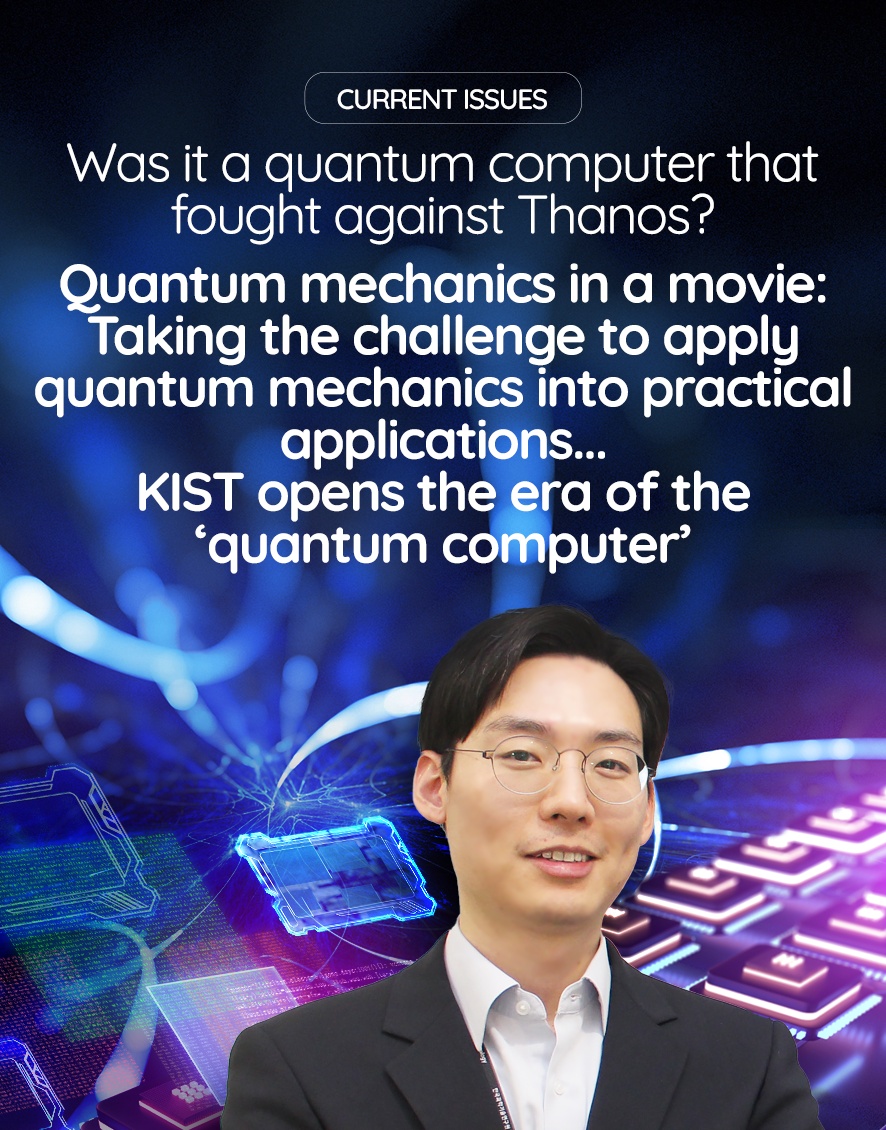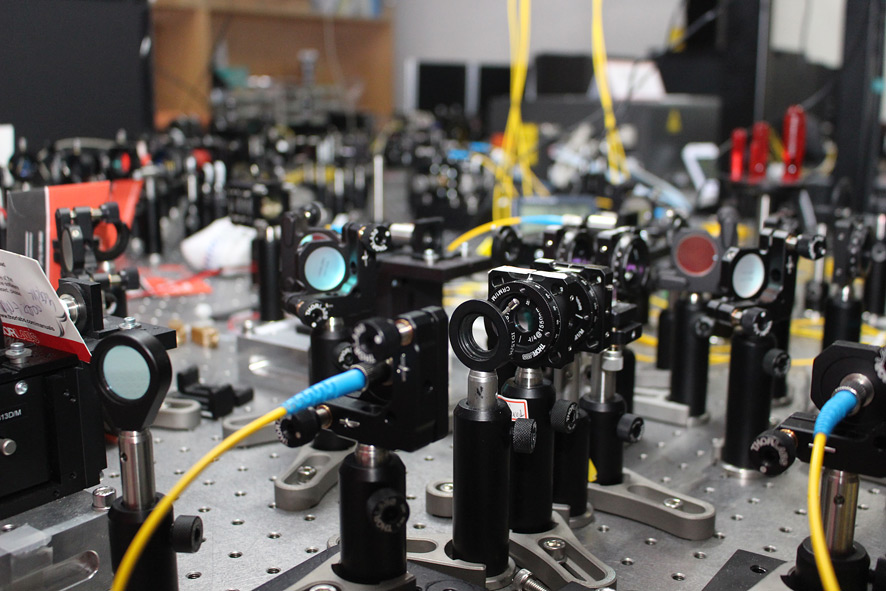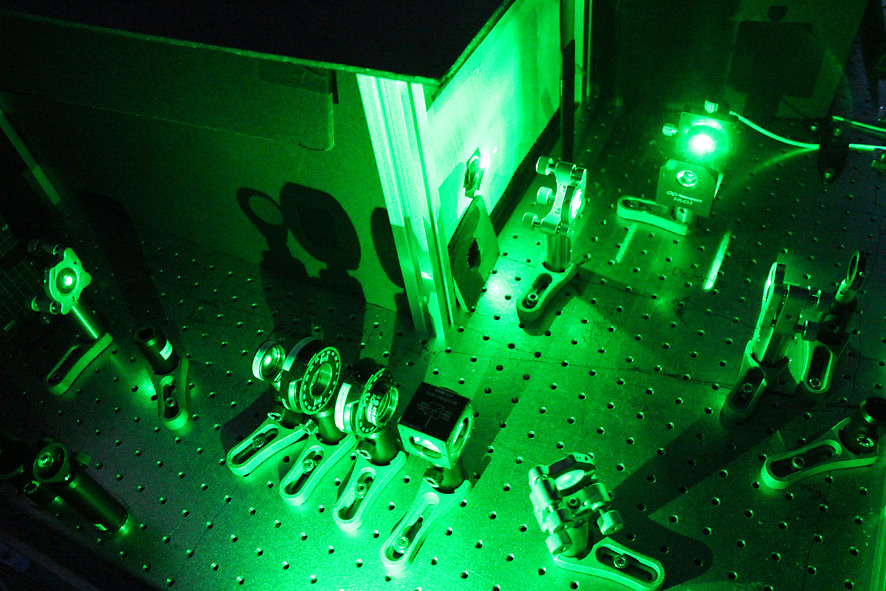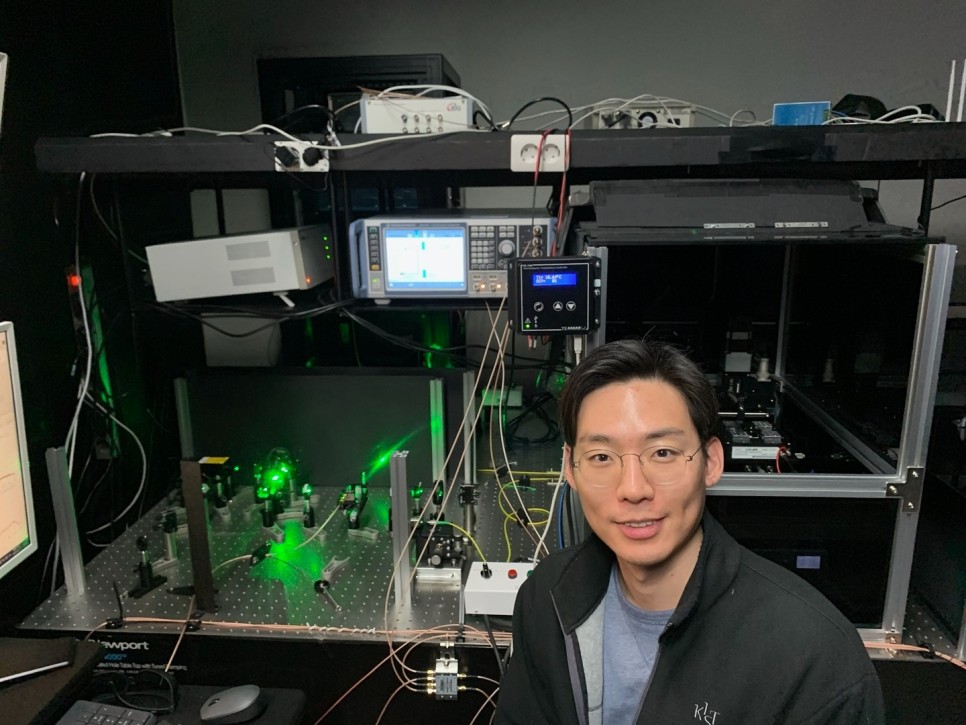News
Was it a quantum computer that fought aganist Thanos?
- Date : 23-03-21
- Views : 625

Was it a quantum computer that fought against Thanos?
Quantum mechanics in a movie: Taking the challenge to apply quantum mechanics into practical applications... KIST opens the era of the 'quantum computer'
Center for Quantum Information at KIST is transforming to an open research institute to strengthen industry–academic cooperation
Conducting research on quantum computers utilizing diamonds; expanding research to include qubit error correction
The future of quantum computers is difficult to predict, but “it will change our lives”
'Ant-Man 3 (Ant-Man and the Wasp: Quantumania)' was the first Marvel movie released this year. It was also released in Korea, where there is considerable Marvel fandom, and has attracted many moviegoers.
Ant-Man's powers come from his suit, which allows him to grow and shrink his body size using Pym particles. However, the scientific concept of 'quantum mechanics' is hidden here. Atom, which is the basic constituent unit and the smallest unit of matter, is composed of a nucleus and electrons. The setting of the movie is that the size of an object can be adjusted by increasing or decreasing the empty space between the nucleus and electrons. Apart from this concept, various quantum concepts, such as time travel and multiverse, are mixed in the movie.
Then, is quantum mechanics realized, and does it exist only in imagination as an element of science fiction? Recently, scientists have been applying quantum technologies in the real world, and the most notable technology is quantum computers.

“In the movie Endgame, there is a scene where Dr. Strange simultaneously simulates various possible scenarios to find a way to beat Thanos. Searching all the possibilities simultaneously rather than sequentially, would it not seem like quantum computers are commercialized?
Quantum computers, explained by Jeonghyun Lee, Ph.D., of the Center for Quantum Information at the Korea Institute of Science and Technology (KIST) resemble the abilities of Dr. Strange. Unlike digital computers that sequentially process and store information in bits with values of 0 and 1, quantum computers have a superposition state, which has a state of 0 and 1 at the same time. By utilizing the superposition state, it is possible to simultaneously calculate the number of possible cases, similar to Dr. Strange's ability. Quantum computers are expected to perform faster computations than supercomputers because they use the superposition state.
Quantum computers are expected to solve problems in seconds that would otherwise take conventional computers thousands of years; so they are a future game changer. Moreover, quantum computing is a field that needs to be researched and developed independently because they are directly related to security threats, such as those that destroy conventional security systems. IBM, Google, Amazon, and Microsoft in the United States have been conducting research to achieve leadership in quantum computing. Korea has included quantum computers as one of the 12 national strategic technologies and is planning to invest 98.4 billion won from the budget this year.
KIST, first among government-funded research institutes to undertake the challenge of quantum technology
Accept the challenge to commercialize quantum technology utilizing diamonds, which have a long research history
"KIST has a deep relationship with diamonds. KIST was the first to develop and commercialize synthetic industrial diamonds in Korea, so diamond is a familiar material. We plan to apply the advantages of diamonds to quantum technology."
KIST was the first among government-funded research institutes in Korea to accept the challenge of researching and developing quantum technology. KIST has been conducting research that encompasses quantum materials and systems by utilizing artificial diamonds. KIST has garnered attention for its research achievements, such as technology transfer for quantum encryption communication systems, the world's second portable quantum computer that operates at room temperature, and a quantum sensor that surpasses the limitations of sensor measurements.
The word qubit appears frequently when describing quantum computers. Quantum computers process and store qubit units, which have the state of 0 and 1 simultaneously. If the qubit unit of a quantum computer exceeds 50, the quantum computer is considered to exceed the capabilities of supercomputers.
The method of designing qubits is broadly divided into superconducting loops, ion traps, photons, silicon quantum dots, neutral atoms, and solid point defects. KIST is researching and developing quantum computers using diamond point defects.
Using diamonds is advantageous as they can be operated at room temperature and atmospheric pressure, unlike other methods requiring high temperature and high pressure. Atoms can be made to operate like a single qubit by injecting impurities instead of carbon into the diamond lattice, which is made up of a carbon lattice. Moreover, KIST, Fujitsu Limited (Japan) and Delft University of Technology (Netherlands) are researching and developing diamond defect systems.
However, unlike ion traps or superconductors, it is difficult to control the position of diamonds. Hence, it is not easy to increase the number of qubits. "There are physical limitations, but it is not completely impossible theoretically. We are working with device development researchers and materials researchers to develop a system that enables diamonds to expand, " Lee, Ph.D., explained.

Accuracy is more important than the number of qubits! We will ensure error rate correction.
Previously, studies on quantum computers that focused on increasing the number of qubits received considerable attention. However, attaining a large number of qubits does not necessarily translate to high computing power. Computations can be performed accurately only when the error rate of a single qubit is [A10] reduced. This means 50 qubits with fewer errors can have much higher computing power than 1000 qubits[A11] .
KIST plans to start conducting research on quantum error correction in a full-fledged manner this year. "The United Kingdom and Australia have set a goal to attain 100 qubits, whereas IBM has set 1000 qubits as its target. However, companies like Amazon and Google have indicated that they are focused on error correction," said Lee, Ph.D. He also explained that "the factor that determines the performance of a quantum computer is diverse. So our research center plans to focus on quantum error correction." He added, "we plan to push ahead with business cooperation with Xanadu, a Canadian company with which we recently signed an MOU."
KIST is paying attention to semiconductor processing, i.e., nano processing technology, to solve quantum errors. Professor Kim Jungsang of Duke University, who co-founded IonQ, Inc. and is a world-renowned scholar in the field of quantum computers, also emphasized semiconductors for quantum computing research and development in Korea at a recently held domestic academic conference.
According to Lee, Ph.D., semiconductor processing utilizes technology to manufacture desired materials in nanometer-level shapes. In the case of quantum computers, semiconductor nano-processing technology can be applied because it controls small units known as qubits and creates qubits in desired locations.
"To perform 'ion implantation,' which injects impurities inside a diamond, in the exact location, it is important to drill a small hole in the desired location. A similar process is used in semiconductors, so it will be possible to utilize it, explained Lee, Ph.D. He also explained that "by using this precision ion implantation technology, we will be able to develop low-noise quantum devices required for quantum error correction technology."

Although we were a latecomer to quantum computers... "we need to develop this technology independently because it is an important technology related to security"
"Although Electronic Numerical Integrator and Computer (ENIAC), the ancestor of electronic computers, was developed for military purposes, it became popular and is being used in everyday life and solving various problems. I think quantum computers have a similar future. Currently, there may be areas in which they are slower than electronic computers. However, these are problems specific to certain mathematical conditions that are considered to be conundrums of electronic computers. Hence, I think quantum computers will change our lives."
Quantum computers are expected to perform computations faster than existing supercomputers. However, they are currently limited in many ways owing to hardware limitations. This is why some say quantum computers may perform additions and subtractions slower than conventional computers.
However, even ENIAC, the ancestor of computers, which was developed for military purposes, did not perform everything well from the beginning. As computers currently generate graphics and are applied in various areas, such as research and AI development, it is not easy to predict how quantum computers will change our lives after they are commercialized.
Lee, Ph.D., said, “If a quantum computer with quantum supremacy is developed, I think some non-deterministic polynomial-time hard (NP-hard) problems that were considered conundrums in classical computers can be solved. Quantum computers are expected to be applied to a broad range of fields, such as chemistry, biology, and physics.” He then added, “Moreover, if quantum sensing with quantum supremacy is made possible, it can be applied to rapid diagnosis of diseases or microscopic research on cellular dynamics. Hence, it can also be used for research to develop new drugs and will have a huge economic ripple effect.”

Although quantum computers are referred to as a game changer that can influence national security and industrial competitiveness, Korea is a latecomer to this technology. The government is increasing the budget for quantum technology, but there is a great shortage of professionals required to research and develop this technology. The Ministry of Science and Technology analyzed the authors of research papers on quantum technology last year based on the total number of authors cited. The analysis result shows that Korea has 500 researchers while China has 5518, the European Union has 4100, the United States has 3122, the United Kingdom has 881, and Japan has 800 researchers. In comparison, Korea has a considerably small number of researchers.
After all, research is conducted by people. Although the government has presented policies to secure professionals, such as establishing a quantum graduate school, the majority opinion in scientific circles is that talented people will naturally gather when the potential of future-oriented projects is consistently shown and realized instead of a one-time investment.
He said, "compared to advanced nations, Korea is a latecomer to quantum computer research. Some have asserted that it would be better to buy this technology. However, quantum technology is deeply related to security, such as threats to existing security systems. Hence, it is important to develop this technology independently." He added, "although we are a semiconductor powerhouse, we must think about the next growth engine. To transition to the next step, many people need to get into this field. I hope an environment will be set up where talented people interested in quantum technology can gather."
Meanwhile, the Center for Quantum Information has moved its research center from Gwanggyo to Hongneung Headquarters and is preparing for a new future. It is breaking down the high barrier of government-funded research institutes and transforming into an open research institute, creating an environment where quantum technology researchers, including school professors and researchers from companies, can come together and focus on research.

